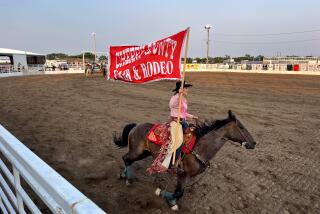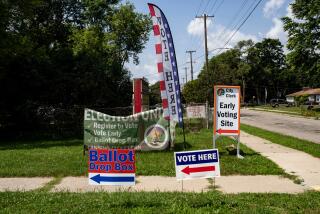Gore Loses Key Weapon in Fight for Heartland
- Share via
BLUE MOUNDS, Wis. — Prosperity?
What prosperity?
Dairy farmer Gary Sutter doesn’t see it. He stands in grimy jacket and grimier jeans, his hands the grimiest of all, and says, as his cows clump together in the dusk, that times here have never been worse.
Rob Riley sure as heck can’t see it either. His wife works two jobs and so does he, as a farmhand and an installer of dairy equipment. “And for what?” he asks, the words curt with disgust.
Prosperity? Yeah, right.
Democratic candidate Al Gore can talk up the economy till he’s blue, but he’s not going to nudge milk prices up a cent. He’s out there bragging, “You ain’t seen nothing yet”? That’s just what folks here are afraid of.
“I voted for Bill Clinton in ’92 and ‘96, and I’m really disappointed in how things have gone,” Sutter said. This time, he’s backing Republican nominee George W. Bush.
Riley too went Democratic in the last two presidential elections. “This time I ain’t so sure.”
The pinch in ag prices--not just in dairy, but in hogs and cattle and grain as well--has deprived Gore of one of his strongest campaign themes among rural voters in the heartland. And rural votes matter, especially in some of this year’s swingiest of swing states, including Wisconsin, Missouri, Pennsylvania and Ohio.
Democrats traditionally have fared poorly in rural areas. Calls for stricter gun control don’t often go over well with hunters. And rural residents tend to be more conservative on social issues, such as abortion rights and school prayer. But Clinton managed to woo quite a few rural independents to his side; he ran just a percentage point or two behind his Republican rivals in rural areas in 1992 and 1996.
Gore has been unable to keep those Clinton converts in his camp.
A nationwide Washington Post poll last week found Gore’s support 20 percentage points weaker among rural voters than urban voters. In rural western Pennsylvania, the vice president’s support has plunged to just 31%. And, while Gore has big leads in St. Louis and Kansas City, Mo., he’s losing badly to Bush across rural Missouri, in some places by as much as 29 percentage points.
One reason: powerful ads by the National Rifle Assn. (“Why [back] Bush? The NRA told me to,” 43-year-old Bill Morrick, a hunter and construction worker, said as he put up a house near Mt. Horeb.)
Another reason: “You’re better off than you were eight years ago” doesn’t resonate with farmers squeezed by stingy commodity prices. (“Clinton hasn’t done nothing for the farm economy,” Riley grumbled.)
A third explanation: Rural voters who pride themselves on straight talk may view Gore as too slippery, too prone to puff himself up.
Take, for example, Art Kirch, a 62-year-old farmer in bib overalls who doesn’t like Bush’s support for school vouchers or his plan to privatize part of Social Security--but who plans to vote for the Texas governor nonetheless because he seems less likely than Gore to “shove things down our throats.” Bush, he concludes, “will be easier to get along with,” and that’s good enough reason to support him.
“Gore has not been able to close the deal with the Clinton independents,” said Bill Carden, 59, a Democratic activist who sat watching his friends--mostly Republicans--play cards in a smoke-choked American Legion hall in nearby Barneveld. “Bush has been the golly gee, oh shucks, plain-and-simple one. It gives people who don’t really understand the issues something to point to” when they make up their minds which candidate to back.
Yet Gore’s cause is not totally hopeless, at least not out here in southwestern Wisconsin.
In fact, conversations with nearly four dozen rural voters in four small towns about an hour west of Madison found strong support for Gore, especially among senior citizens who said they trust him--and not Bush--to shore up Social Security and cut their prescription drug bills.
For every voter who voiced concerns about Gore’s character--too arrogant, they said, or too deceitful--another dismissed Bush as too spoiled, too inexperienced or too beholden to big business.
“I look at Bush and I just think he’s the big-money man. He’s going to do whatever the corporations tell him to,” said Debbie Steinhoff, 35, a part-time teacher walking her toddler to the playground in Ridgeway (population 637).
“Bush is too young to be president. I don’t think he knows what he’s getting himself into,” said Lloyd Baeten, 66.
Gore’s apparent inroads with some voters in this region in part reflect the changing nature of the rural Midwest.
There are, of course, plenty of tiny, isolated towns that remain utterly dependent on the farm economy. But rural stretches closer to major cities are starting to draw a new population, including seniors retiring to the quiet of the country and factory workers (some of them union members sympathetic to the Democrats) who can’t afford suburban homes.
“There are real problems with the [rural versus urban] analysis in polls because . . . it’s tough to identify exactly what one means by rural,” said Charles O. Jones, a professor emeritus of political science at the University of Wisconsin at Madison. “So many once-rural towns around Madison are now bedroom communities, so the whole nature of them has changed.”
Even in true farm communities, political allegiances are starting to shift.
Proud of their self-reliance, rural voters traditionally have opposed big government. Yet many now find themselves counting on the government to do something, anything, to save family farmers from the corporations that have gobbled whole sectors of the agricultural economy, including pork and poultry. For many then, big business, not big government, is now the enemy. And that makes them more receptive to--if not entirely won over by--the Democratic platform.
Dairy farmer Bonnie Hodgson, for one, voted for Republican Sen. Bob Dole in the 1996 election and says she’d like to back Bush because he has promised to open more overseas markets to farm exports. Yet she can’t get over her feeling that he’s the big-money candidate, “born with a silver spoon in his mouth.” Hoping Gore will prove more responsive to the little guy--especially the family farmer she fears is doomed--Hodgson says she’ll probably vote Democratic.
To court independents like Hodgson, the Gore campaign has been sending caravans of the vice president’s agricultural supporters throughout the rural Midwest in a drive dubbed Harvest 2000. Bush too has been pushing for the rural vote, sending agricultural commissioners from Texas and other farm states on tours of up-for-grabs counties.
The candidates themselves, however, have not had much to say about agricultural policy. Which leaves voters like Jeff Wright, a feed-store employee, feeling neglected--and a bit alarmed.
Wright is leaning toward Bush, mostly on the strength of social issues. But agriculture is his main concern. And on that issue, he complains, neither candidate seems to know much, “which is scary.”
In the end, Wright says, he can only hope that, whoever is in the White House come January, when agricultural policy is on the table, “our local representatives will set them right.”
More to Read
Get the L.A. Times Politics newsletter
Deeply reported insights into legislation, politics and policy from Sacramento, Washington and beyond. In your inbox twice per week.
You may occasionally receive promotional content from the Los Angeles Times.










